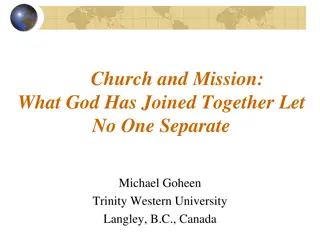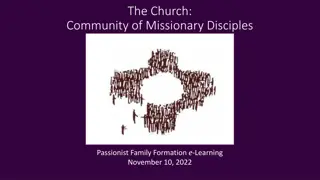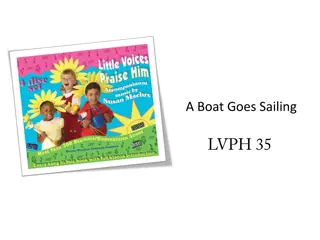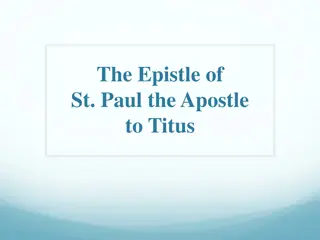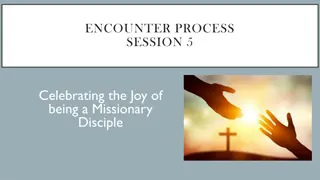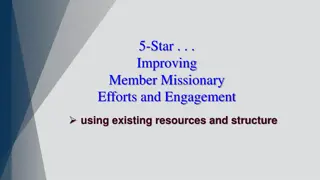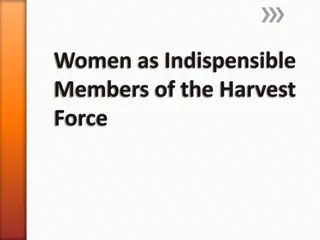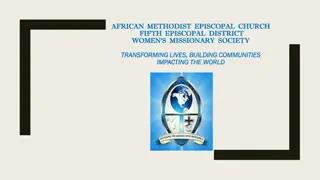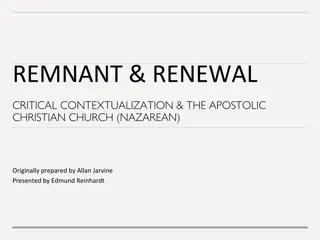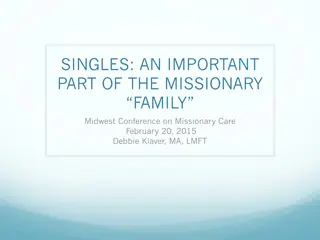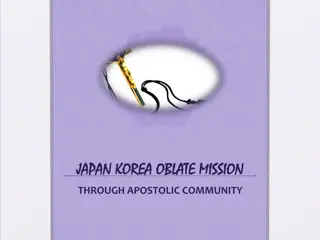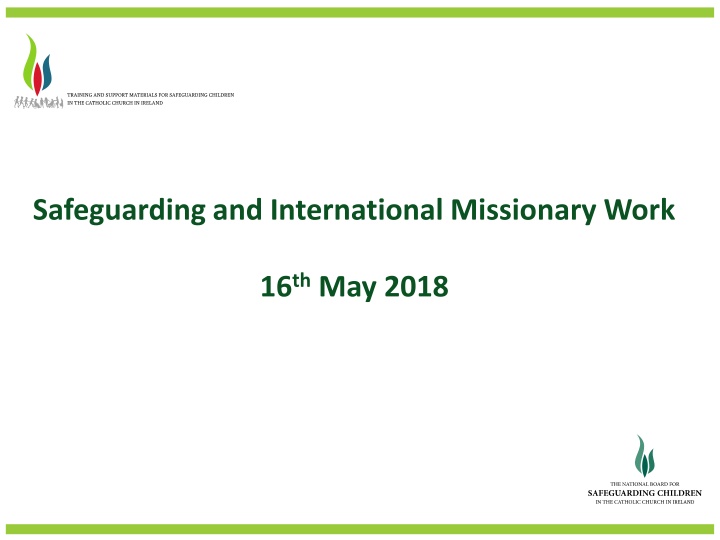
Exploring Myths and Safeguarding in International Missionary Work
Discover insights and best practices for addressing myths and safeguarding in international missionary work. Learn about challenges, standards, and resources to ensure safe and effective mission practices. Join the discussion on transferability of safeguarding standards and more.
Download Presentation

Please find below an Image/Link to download the presentation.
The content on the website is provided AS IS for your information and personal use only. It may not be sold, licensed, or shared on other websites without obtaining consent from the author. If you encounter any issues during the download, it is possible that the publisher has removed the file from their server.
You are allowed to download the files provided on this website for personal or commercial use, subject to the condition that they are used lawfully. All files are the property of their respective owners.
The content on the website is provided AS IS for your information and personal use only. It may not be sold, licensed, or shared on other websites without obtaining consent from the author.
E N D
Presentation Transcript
Safeguarding and International Missionary Work 16th May 2018
Welcome and Prayer Teresa Devlin
Aims for the Day To discuss myths around international missionary work and their impact on safeguarding To discuss the transferability of the safeguarding standards to international missionary work To share resources and best practice
Introductions Teresa Devlin
Introductions In each group introduce yourself and answer the following questions 1. Where is your Church body currently involved in children s ministry? 2. What safeguarding issues have come up as part of this ministry?
Myths Niall Moore
Westerners should fit in with our culture not us with theirs
Hitting children is part of discipline
In our country a child of any age can consent to sex
Police are corrupt in this country and telling someone will do more harm
It is not abuse if you are benefitting the child or their family
Children are tainted by original sin and require exorcisms
There is no child abuse by the Church in this country, only abuse in families
Expectations of Missionary Work and Remit of NBSCCCI Teresa Devlin
National Board does not have a remit over international practice However . The Expectation is that the standards set in Ireland are maintained abroad
Allegations against Irish Priests and Religious are reported to the National Board Discussions about which Police and Social Services are notified Consideration about returning respondent to Ireland Issues around oversight if respondent remains in missionary work
Experience of safeguarding and missionary work Sr Gabrielle Farrell OLA
CHILD SAFEGUARDING MISSIONARY SISTERS OF OUR LADY OF APOSTLES (OLA) INTERNATIONAL TRAINING SESSION
WHY ORGANIZE AN INTERNATIONAL SESSION? To streamline our approach to Child Safeguarding across the Congregation. A generic Congregational Policy was developed for the Congregation which could then be adapted to suit the various contexts. 2009 - 2017
HOW To develop the policy, we formed an international working group from across the Congregation. Based on the model of the Child Safeguarding Policy of the Catholic Church in Ireland Once this policy was drafted, we organized a basic international training inviting one member of each Province/District within the Congregation. We had a total of 18 participants.
WHAT WAS THE AIM OF THE SESSION To provide some basic information on child abuse, child protection and child safeguarding To present the Congregational Policy in detail, highlighting the areas that need to be adapted to suit the local context. To prepare participants for feedback to leadership in their Provinces/Districts as well as to all sisters. This feedback aimed at raising awareness of child abuse and an introduction to the OLA Policy.
Presentation Of Provinces/Districts Full Training Day Types Of Child Abuse Congregational Policy Safeguarding And The Vows United Nations Convention On The Rights Of The Child
LOCAL CONTEXT - CHALLENGES Knowledge of the Law e.g. age of child Children's Rights v Responsibilities Personnel References Reporting Structures Vetting Process Declaration form Child Abuse
WHAT WORKED? There is a good level of commitment form the leadership throughout the Congregation. Participants gained a good foundation in the different types of abuse Good awareness of the aspects of the policy that need to be adapted to the local context Good reports were received on the feedback and there has certainly been an increase in awareness and commitment in many provinces.
Nigeria - feedback to the Cardinal who invited Sister to address all the priests in his Diocese and subsequently she has been invited to a number of Diocese OLA schools/hospitals/clinics implementing the standards - training staff - volunteers Communicating the message - posters Greater confidence
WHAT HAS PROVED MORE CHALLENGING? Adaptation of Policy to Local Context Within the Congregation, the contexts are very different and each context has its own challenges. For the older Provinces, they are overwhelmed with the detail of the Policy and find it difficult to select what is appropriate for their context. For Provinces in the Arab World, their particular context means this can be a taboo subject so it can be very difficult to speak about.
Lack of Support Systems For many Child safeguarding remains a very new issue and the systems are not really in place to support the implementation of a policy policing, social services etc. Even when there are reporting structures in the local context, lack of trust in some institutions (e.g. police) means it can be difficult to implement according to what is recommended.
Internally in the Congregation Having systems in place to support Provinces and Districts To monitor the implementation of the Policy.
OTHER INTERNATIONAL TRAINING 2 days training for Sisters going on mission for first time. Preparation for final vows
Group Work In each group discuss the following: 1. What are your approaches to safeguarding and missionary work 2. What challenges have you faced 3. What resources do you have that you are happy to share
Transferability of the Standards Niall Moore and Teresa Devlin
Policies and Procedures In Ireland we have one Church policy and a series of standards, indicators and procedures to ensure this policy is lived out It is important you develop an international policy for your ministries overseas
Contents of a Policy Policy Statement Principles Gospel values National and International legislation and policy Learning from the past Commitments Reporting and Responding Caring for children and adults that work with them Caring for complainants Caring for respondents
Standard 1 Safe recruitment (visiting priests and religious) Children and adults codes of behaviour Safe care (consent forms, supervision ratios) Complaints Information technology
Standard 2 How do I report? Who do I tell? What do I do if I receive a referral from someone overseas, and it is referred to me in Ireland?
Mandated Persons Mandated persons (as defined in the Children First Act 2015) are people who have contact with children and/or families and who, because of their qualifications, training and/or employment role, are in a key position to help protect children from harm Each Church body should consult the full list of categories who are classified as mandated persons under Schedule 2 of the Children First Act 2015 to establish which members of Church personnel are classified as mandated persons
Mandated Persons It should be understood that: All clerics and religious who have any ministry are to be considered mandated persons Volunteers are not mandated persons under the Children First Act 2015. However DLPs or Deputy DLPs who are volunteers are classed as mandated persons under Church standards.
Mandated Persons On completion of this process the Church authority must retain a list of all mandated persons, and ensure this is kept up to date. In developing this list Tusla have advised that there should be a clear statement of the type of roles that a Church body are listing as mandated persons then a number of mandated persons that are in the Church body against each role. For Example Clerics (25), Pastoral Workers (50), Religious (15) etc). For more information see Guidance 2.1L
Standards 3 and 4 It is always appropriate to offer pastoral support to complainant no matter where in the world Canon law applies internationally and therefore the presumption of innocence and canon norms apply anywhere in the world
Standard 5 Adapt the training programme to suit Induction is always needed Working with parents and guardians are always needed
Standard 6 Giving information to Church personnel and staff will always be required and making it relevant to the culture and language of the region you are operating in
Standard 7 How can we quality assure in the context of international missionary work?



